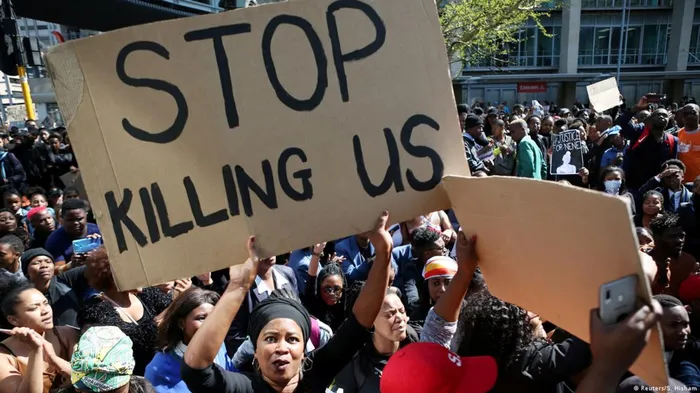Cooperaton needed to eradicate femicide and violence

Picture: Reuters/S. Hisham - Women march in South Africa against femicide and Gender-Based Violence. The country is considered to be one of the most unsafe countries for women and children, says the writer.
By Dr Nozi Mjoli
The underlying causes of gender-based violence and femicide (GBVF) are the deeply entrenched cultural beliefs and attitudes that perpetuate inequality and powerlessness of women and girls.
GBVF often manifests as power imbalance where men are perpetrators and women or girls are victims. Men are socialised to be aggressive, powerful and unemotional while women are socialised to be weak and submissive to men. These cultural beliefs have been very successful in keeping the pillars of patriarchy in place for centuries.
South Africa is considered to be one of the most unsafe countries for women and children. Almost every day the national media carry stories of women or children who have been raped or murdered.
In response to this high incidence of GBVF, President Cyril Ramaphosa held a 2nd GBVF Summit on November 1 and 2. This summit was a follow-up to the 1st Presidential GBVF summit which was held on November 1 and 2, 2018.
The President’s speech highlighted the following statistics that demonstrate the extent of GBVF incidence in South Africa: a 52 % increase in the murder cases of women and 46% increase in the number of children murdered between the first quarter of 2021 and the first quarter of 2022. All these lives were lost at the hands of men.
The President presented the major government’s achievements in response to the plight of women during the past four years since the 1st Presidential GBVF summit that was held in 2018. These included three pieces of legislation which were signed in January 2022.
These include the Criminal law (Sexual Offences and Related Matters ) Amendment Act, the Criminal and related Matters Amendment Act and the Domestic Violence Amendment Act. To facilitate acceleration of the prosecution of sex offenders, 83 courts were upgraded to Sexual Offences Courts.
The major output of the 2018 Presidential GBVF summit was the signing of a declaration by government, business, labour and civil society to collaborate in conceptualisation and implementation of concrete measures to eradicate GBVF.
Signatories to the Declaration called for a multi-sectoral structure to be constituted to coordinate the implementation of a National Strategic Plan on GBVF. An Emergency GBVF response Action Plan was developed and tabled for approval by Parliament during a special joint sitting on September 18 2019.
Initiatives implemented for preventing GBVF included an announcement of a R21 billion government grant for a three-year period to support the implementation of the National Strategic Plan for GBVF.
These funds have been committed to the economic empowerment of women, support of survivors, the strengthening of the criminal justice system and implementation of prevention programmes.
In addition to the government grant, a private sector-led GBVF response fund was established which has to date received R162 million and 112 grant partners have been funded.
The President’s speech highlighted a number of successes, namely, putting the GBVF problem firmly on the national agenda, the establishment of critical institutions coupled with the mobilisation of significant financial resources.
The national government must be commended for funding the initiatives for empowering GBVF victims and improvement of the legal framework for prosecuting the perpetrators of GBVF.
The focus of the National Strategic Plan on empowerment of victims of GBVF and strengthening of legal measures for prosecuting rapists and murderers of women and children is not adequate for the eradication of GBVF from the South African society.
There is a need to allocate funding for research to identify the factors that motivate men to rape and kill women and children so that appropriate interventions can be implemented to rehabilitate these men.
The eradication of GBVF requires a multidimensional approach that addresses empowerment of victims and research to understand the causes and factors that motivate men to rape and murder women and children.
There is a need for measures to dismantle the pillars of patriarchy which promote power imbalances between men and women through cultural and social norms which encourage masculine aggression and dominance.
The South African Constitution guarantees equal rights for everyone irrespective of gender or race. The Employment Equity Act has been effective in helping women to advance to top leadership positions in public and private sector organisations and to achieve significant economic empowerment.
Prior to the democratic transformation of South Africa, the majority of black women had no economic power, because they were concentrated in low paying support roles in the workplace. This, while men were in leadership positions which paid high salaries.
It would be important to conduct research to determine how the significant economic empowerment of women has contributed to the increase in the incidence of GBVF in South Africa.
The eradication of GBVF in South Africa requires the co-operation of all sectors of society such as households, local communities, schools, political parties, cultural, religious and government institutions.
Special programmes must be implemented in schools to promote gender equality and empowerment of girls by building their self-esteem and self-confidence so that they can be able to challenge abusive men. It is anticipated that the outcome of these interventions will contribute to the building of a society where there is mutual respect between men and women.
Mjoli is a gender activist based in South Africa.